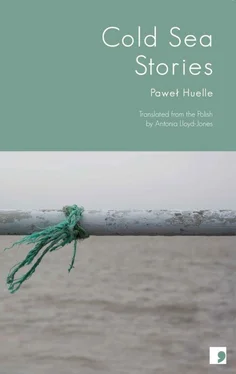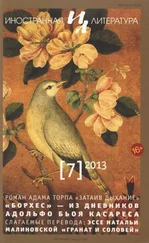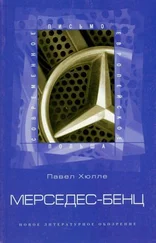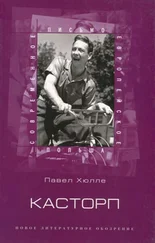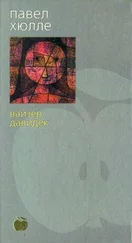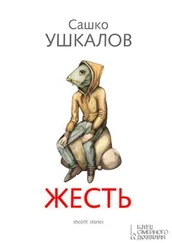Squinting, he came out onto the road, flooded with brilliant light, and instead of heading back in the direction of the buildings, he walked towards the dunes. Only when he noticed the large, motionless sail of a windmill did he stop, wondering whether to turn round. But his curiosity won, and he climbed the last few metres of the slope, wading up to his ankles in cloying, hot sand. To his amazement he found himself looking at transmission belts, cog wheels, a dynamo and a transformer, through which no current had ever flowed. Someone had never finished their work here, as proved by some rolls of wire waiting to be unwound, and some insulators and transfer boxes resting against the walls.
Yes, this was what he wanted to ask about, when, tired by the heat and by trudging round the village, he quietly entered her house. He patiently accepted the chair she offered and sat down at the kitchen table, but she wouldn’t listen to his short, measured sentences, each followed by a long pause; she wasn’t going to explain away his doubts, and he was surprised when, instead of setting a plate or a bowl of steaming buckwheat on the table, she put down a thick exercise book, from which she tore a half-blank page; yes, he was surprised by her childish handwriting, so different in style from the sums set out on the top half of the page, among which from the corner of his eye he noticed the items: ‘glazing – 4 gulden 75 pfennigs’ and ‘fence paint – 2 gulden 43 pfennigs’ (which together made 7 gulden and 18 pfennigs, if he hadn’t made a mistake in his addition); yes, he was surprised by the expression in her eyes, which she raised from the sentence she had just written to look straight at him – it was imperative and insistent.
‘A man and a woman cannot live in the same house together unless they are married or related,’ he read, ‘so you must choose another house for yourself, there are tools everywhere, you need to dig the garden, I have some seedlings, please come for dinner each day at noon .’
All he said was: ‘Yes, but of course.’ And before she had finished writing the next sentence, he had left, muttering under his breath: ‘A thousand thanks, young lady.’
She watched him through the window. He stopped by the Helkes’ yard, but after a brief hesitation, just as if he didn’t wish to live close to her, he moved on, only disappearing from view at the van Dorns’ house. She was surprised when he didn’t emerge from it for a good quarter of an hour for, as he was living there now, he could and should come to dinner. But he did not come. Nor did he deign to appear the next day, as she waited with nettle soup. Of course she kept seeing him, marching towards the river with some fishing pots, or bustling about in the garden, around the shed, but never with a spade in his hands. She grew more and more curious about why he would disappear into the forest for whole afternoons on end, and what he did at home in the evenings, with no candles or oil, all on his own, just as she was.
Imperceptibly, day after day went by, and suddenly she realised that she wanted to hear the sound of his voice, whatever it might mean, and that she was longing to tell him everything, with the help of pencil and paper. But she lacked the courage. Her father would surely have been glad that she had given him help, but paying a visit to a strange man – without higher necessity – could only mean one thing: a breach of the law and yet another sin.
‘Would that still be the case if I took him some fritters and watermelon salad?’ she asked herself, and then an inner voice instantly reminded her: ‘An unmarried girl does not meet a man without witnesses, if he is not a member of her family.’
Meanwhile the newcomer was behaving eccentrically. He never worked in the garden, usually slept until noon, then disappeared somewhere on the river or in the forest, and in the evenings, if he wasn’t hammering in the shed, he would sit under the van Dorn’s great lime tree and motionlessly stare at the sky, waiting for dusk. One day, as she was spreading out the sheets in the orchard, he came up unexpectedly quietly and left a fair-sized bundle on the porch. It was a wild rabbit: dressed, roasted and wrapped in a burdock leaf. Another time she found a bag full of fish on the threshold: zander, roach and pike, gutted and interlaid with herbs; although it was summer, they smelled to her of autumn and the past. But how was she to tell him about it? About the full nets, the smoke over the waters and the barrels the men would roll into the larders when the first chilly weather came? And anyway, what concern of his could such matters be?
Suddenly she sensed that that old world, which had literally vanished before her eyes, would never return to its former shape. She could, as until now, comfort herself with hope; she could mentally repeat Harmensoon’s prophecy that the righteous would return to their dwellings, but right now, as she cut the fillets of zander into even white strips, the awareness that what had happened already could never be undone cast chaos and doubt into her soul.
Towards evening, with a pot full of stew (there would have been enough for two families), she set off for the van Dorns’ house. But the voice she heard coming from inside was not the stranger’s. Willman was talking loud and uninterruptedly, with the other man just asking him the occasional question, so quietly that even if she leaned her head towards the open window, she couldn’t catch the details, which flew away like insects into the warm, all-embracing dusk. She didn’t want to eavesdrop. Nevertheless, as she entered the cool hallway, something stopped her on the threshold of the room. Wasn’t the hero of their tale Bestvater, who had been driven out and excommunicated just like Hanna? The men had taken a vote, but before that Harmensoon had made a long, angry speech.
‘Isn’t there enough depravity for you in other communities?’ he had thundered. ‘Do you imagine, you naïve people, that it will stop at machines for churning butter and lamps in your homes? Your sons will bring wireless sets here, and your daughters, wives and daughters-in-law will bring in hats with ribbons! Is that the proper way to emulate the Lord? Our axes, ploughs and nets, our chisels and our planes, and finally our hands and our prayers – aren’t they enough for us?’
Willman fell silent; the stranger shifted restlessly on his chair and asked: ‘And then what happened?’
‘Then,’ sighed Willman, ‘those who had agreed to electricity raised their hands, but there were only three of them: Helke, van Dorn, and the widower.’
‘What widower?’ There was a note of despondency in the stranger’s voice. ‘Have you already told me about him?’
‘Yes, Wolzke, the father of that idiot,’ said Willman, sniggering. ‘And Bestvater too, but he had no right to vote, because the windmill and all that electricity were his doing, so he dropped it all and left the next day.’
‘He left…’ the stranger interrupted. ‘That is, you mean to say you expelled him, just like that?’
But in Willman’s words there was no doubt, not even a shadow of regret: Bestvater himself had loaded his belongings onto a horse-drawn cart, slammed the door of his cottage, and as he drove past the chapel, he had screamed for everyone to hear him: ‘Harmensoon, you fool, you’re not interpreting the Book, you’re poisoning it with your venom, and everyone here is going to die of it!’
She listened to this with greater anxiety than on that day in the past, outside the chapel, whence her father had dragged her home, away from the din and hubbub of outraged voices. Now, learning for the first time about the hand Bestvater had raised, his gesture opposing Harmensoon, suddenly she was stunned, driven into a bizarre state of confusion she had never felt before. And although Willman went on to say how Bestvater had moved to the Tiegenhagen community, where there weren’t actually any dunes or sea, but the men’s waistcoats did have buttons instead of hooks, where electricity had just been installed and where the elders were the brothers de Veer, Jan and Piotr, not many of these things got through to her. Finally, when Willman had finished and silence reigned in the room, she pushed the half-open door, left her pot of stew on the table, and made such a rapid exit that the two amazed talkers hadn’t even the time to stop her in the hallway.
Читать дальше
